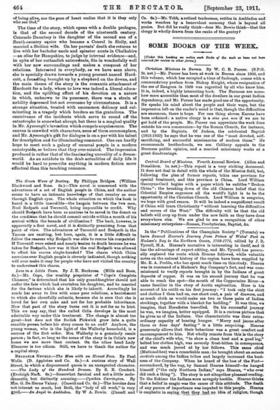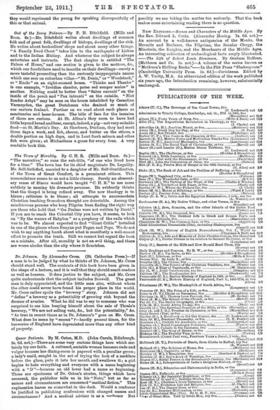In the "Publications of the Champlain Society" (Toronto) we have
Samuel Hearne's .Tourney from Prince of Wales' Fort in Hudson's Bay to the Northern Ocean, 1769-1772, edited by J. B. Tyrrell, M.A. Hearne's narrative is interesting in itself, and it has the advantage of expert editing, and Mr. Tyrrell has person- ally explored the route which Hearne followed, while valuable notes on the natural history of the region have been supplied by Mr. E. A. Preble, who has spent much time on this study. Hearne was in command of a Hudson's Bay Company's fort, and was coin. missioned to verify reports brought in by the Indians of great deposits of copper. It was on his second journey that he was able to reach the spot—the mouth of the Coppermine River—a name familiar in the story of Arctic exploration. Here is his account of his outfit on his first journey: "I took only the shirt and clothes I then had on, one short coat, a pair of drawers, and as much cloth as would make me two or three pairs of Indian stockings, together with a blanket for bedding." It was thus, we imagine, that Herodotus travelled. On his successful journey he was, we imagine, better equipped. It is a curious picture that he gives us of the Indians. One characteristic was their extra- ordinary capacity of bearing hunger. "Merry and jocose after three or four days' fasting" is a little surprising. Hearne generously allows that their behaviour was a great comfort and encouragement to him. Not wholly remote from this is the story of the chief's wife who, "to show a clean heel and a good leg," belted her clothes high, was severely frost-bitten in consequence, and was much jeered at by her fellows. This same chief (Mationahbee) was a remarkable man : he brought about an entents cordiale among the Indian tribes and largely increased the busi- ness of the Company. When he heard of the loss of the Fort— surrendered, by the way, by Samuel Hearne himself—he hanged himself ("the only Northern Indian," says Hearne, "who ever did such a thing "). The story is not altogether pleasant reading. To the Eskimo the Indians were savagely hostile. Hearne thinks that a belief in magic was the cause of this attitude. The death of any person of importance was imputed to this people. Hearne is emphatic in saying .that they had no idea of religion, though they would reprimand the young for speaking disrespectfully of this or that animal







































 Previous page
Previous page